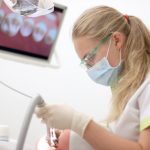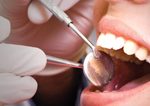The Colgate Bright Smiles, Bright Futures CPD programme focuses on children and involves community engagement via a range of settings such as primary schools, nurseries and children’s clubs. This programme encourages greater community engagement and is a great way to promote your practice whilst providing leadership opportunities for all team members to develop additional skills.
Each year an award is presented for the best practice entry as judged by the British Dental Association (BDA) and the British Association for the Study of Community Dentistry (BASCD). The 2016 Community Engagement Award was presented to John G Plummer and Associates at the BDA British Dental Conference 2017. The team was represented by Jevneet Kular and Amrisha Ondhia, both associate Dentists at the practice.
Jevneet and Amrisha outlined their practice’s community engagement, sharing that the team had originally set up a ‘Happy Smiles Club’ within the practice to provide oral health education to children and their parents. They quickly realised the positive impact this was having from the feedback they received and realised the potential to expand the Happy Smiles Club beyond their patients’ families into the wider community. Using inspiration from the Colgate Bright Smiles, Bright Futures Practice Pack and CPD Programme they approached various children’s clubs, schools, nurseries and event organisers within many settings including Brownies and Rainbows. Through this engagement they reached children of all ages, ranging from one-year-olds to young adults.
The practice utilised patient information leaflets, brushing charts, posters, samples for patients and stickers found within the Colgate Bright Smiles, Bright Futures Practice Pack. They used these materials to support their tooth brushing advice using age appropriate models, and with consent, they used plaque disclosure to demonstrate areas the children may be missing when brushing their teeth. Additionally, they provided information on sugar content in foods and drinks and showed the effects these can have on their teeth.
They used feedback forms to find out what went well and why. All aspects of their community engagement programme proved to be successful from the feedback they received, with 82 per cent of contacts who completed the feedback saying they found it extremely helpful. They have interacted with children of all ages and they tailored the information in an age appropriate way. They also used the opportunity to engage with carers/parents and teachers with many showing interest in learning more about oral health. Another outcome which arose from this community engagement was seeing many children who were previously more anxious about the dentist, returning or attending the practice as new patients and being more relaxed and cooperative according to their parents.
Although they have already extended beyond their practice they would like to expand their community engagement even further. They are considering after school clubs and parent and toddler groups which would allow additional engagement to deliver key oral care messages from ‘Delivering Better Oral Health’ in a fun and interactive way.
The team at John G Plummer and Associates hopes it’s knowledge shared through this community engagement delivered using the inspiration from the Colgate Bright Smiles, Bright Futures Practice Pack will have played some part in improving oral health in generations to come.
Would you like to get your practice involved in this year’s programme? The 2017 Colgate Bright Smiles, Bright Futures CPD programme is available to download from one September 2017 by visiting www.colgateprofessional.co.uk and clicking on the Bright Smiles, Bright Futures link. Engage with your local community and tell us what you have done for a chance of winning the 2017 Community Engagement Award.
















